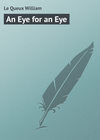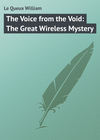Czytaj książkę: «The Mysterious Mr. Miller», strona 8
Chapter Seventeen
What Happened in the Night
Whether the recognition had been mutual I was unable to decide.
If it had the newcomer made no sign, but extended his hand and greeted me, while I, striving to remain unconcerned, returned his welcome.
“Your father tells me he’s driving over to Swanage at half-past ten, Miss Lucie. Are you coming with us?” he asked, as he lounged with his hands deep in his jacket pockets, and an after-breakfast cigarette between his lips.
“I don’t think so,” was her reply. “I’m lunching with the Strong girls.”
“Oh, do come,” urged the dark-faced man. “You’d be back before one. You promised me yesterday that you’d drive me somewhere.”
“So I will – to-morrow, perhaps.”
I watched the man’s thin shaven face, and looked into his grey eyes in silence. His was a countenance striking on account of its clear-cut features, its mobile mouth, its high intellectual forehead, and its protruding jaws – an eminently clever, good-humoured face, and yet the expression in the eyes was, somehow, out of keeping with the rest of the countenance.
He laughed lightly, making some chaffing remarks, whereat the slight flush that arose in Lucie’s cheeks told me that she was not altogether averse to his evident admiration. He was a pleasant fellow – but, nevertheless, a mystery.
His appearance there had, for two reasons, startled me. The first was because I had no idea that Miller had a male visitor, and the second was because I recognised him as a person whom I had long desired to rediscover.
The last occasion I had seen him he had called himself Lieutenant Shacklock, R.N. It was in very different circumstances. He had worn a moustache and beard, and affected a gold-rimmed monocle. His personal appearance as he stood there laughing with Lucie was, however, very different, yet those cold grey, close-set eyes were the same. They wore an expression that could never be altered or disguised.
We spoke together once or twice, and I began to feel convinced that he was unaware of our previous meeting.
“Yes,” he remarked to me. “Beautiful old place this. I wonder my friend Miller doesn’t live here more. If I were in his place I’m sure I’d prefer it to wandering about the Continent.”
“You’ve been here before, I suppose?”
“Many times. Miller, when he’s home, generally invites me,” and then he turned to Lucie, by whom he was undoubtedly attracted. Little wonder, indeed, when one recognised how handsome she was.
I again stood silent, my eyes turned upon the spruce man’s face – the face that brought back to my mind a curious and mysterious incident in my wandering life abroad.
When one travels on the Continent as I had travelled, spending years of aimless wandering and lazy idling in the halls and smoking-rooms of hotels of the first order, making passing acquaintances of men and women of all grades and all nations, listening to music in illuminated gardens, and sometimes wandering with some fair table-d’hôte acquaintance beneath the stars, one meets with some queer adventures. I had met with a good many. One of them I now found myself recalling.
Three winters before I found myself, after the brilliant season at Monte Carlo, at a little sea-side resort called Nervi, which, as travellers know, is a few miles beyond Genoa, on the way to Rome. You have possibly looked out of the train and there obtained a glimpse of the blue Mediterranean beating upon its brown rocks; you have admired the splendid white villas of the Genoese merchants, and you have, probably, noticed behind the little railway station a great hotel garden, with green lawns and a splendid avenue of spreading palms.
In that garden one April night after dinner I was strolling and smoking with two men, who were friends. We had met casually in the hotel a few days before; a pleasant word or two, cocktails in company, a proffered cigar, and we at once became acquaintances, as is the way of cosmopolitans. The elder was named Blenkap, a man of sixty, a wealthy ironmaster from Pittsburg; while Shacklock, the other, was much younger, smart, and had just retired from the Navy.
That night we wandered through the gardens to the sea, which lay like glass beneath the light of the white Italian moon, with the waves sighing softly upon the shingle. But Blenkap, after half an hour, complained of being rather unwell, and while the lieutenant went into the town to purchase some cigarettes I accompanied his friend back to the hotel.
It was then about ten o’clock, and refusing to allow me to call a doctor, the American went to his room. At two o’clock in the morning I was awakened by the night-porter, who said that number ninety-seven had asked him to call me. Hastily I dressed, and, on going along the corridor, found Blenkap in bed in a state of collapse.
“I’m very ill; the pains in my head are terrible,” he whispered to me. “Will you call a doctor – somebody who speaks English, if possible?”
His white face alarmed me, and I left him and went along to the lieutenant’s room at the other end of the corridor. To my knock there was, however, no response, but on turning the handle and opening the door, I found the room in darkness and empty. He had not returned. Therefore I hurried out, and in half an hour returned with an Italian doctor who spoke a little English.
On entering the room I noticed that the doctor sniffed the air mysteriously as he crossed to the patient, who I now saw was unconscious. He examined him, asked me a few brief questions, and then fixing his eyes upon me, exclaimed in Italian: —
“This is a rather curious affair, signore.”
“Why?” I inquired. “The gentleman was taken this evening while we were walking together. He complained of bad pains in his head and stomach.”
“Yes, but who gave him the anaesthetic?” asked the doctor.
“Anaesthetic!” I exclaimed. “Why nobody, as far as I know.”
“Well, chloroform has been given him, and quite recently. He struggled against it – don’t you see?” and he indicated the American’s clenched hands and the disordered bed. “How long were you absent?”
“About half an hour.”
“Then some one must have come here while you were away,” the doctor declared, stroking his dark beard very thoughtfully. At first I was alarmed lest the unfortunate American might die, but the doctor, after due examination, assured me that there was really no danger. For half an hour we sat and waited, until at length the man to whom the anaesthetic had been so mysteriously administered regained consciousness. It was a slow recovery, but when at length his dull eyes fell upon me he beckoned me to him and with excited gestures pointed to a leather-covered box beneath a table opposite. I pulled it out and tried the lock. It was still secure, and he nodded in satisfaction. Presently the doctor left, and I returned to bed, but imagine my blank amazement next morning when, just as I was sipping my coffee in my room, Blenkap dashed in, crying: —
“I’ve been robbed! That fellow, Shacklock, did it! He must have crept into my room while you were away, rendered me senseless, took the key from the gold chain I always wear around my neck, opened the box, extracted the whole of the money and jewellery, relocked the box, and then had the audacity to replace the chain around my neck!”
“But he is your friend?” I exclaimed, with astonishment.
“I only met him a fortnight ago at the Grand at San Remo,” he answered. “He was there with a friend of his – probably a thief also. But he came on here alone with me. The fellow has taken over eighty thousand dollars!”
I hurried with him to the questore, or chief of police, and telegrams were quickly despatched hither and thither, but the thief had evidently got back to Genoa by the train at three o’clock in the morning, and embarked at once upon some ship for a Mediterranean port – Naples, Marseilles or Algiers. At any rate, though I remained a month in Nervi, we never heard further either of the easy-going naval man, or of the eighty thousand dollars in American notes and negotiable securities. Without doubt it was intended by the thief, or thieves, to throw the first suspicion upon myself, but fortunately the night-porter stated most positively that he had seen the lieutenant coming from his friend, Blenkap’s room, ten minutes before my return with the doctor. The man had left the main door of the hotel ajar in order to admit us, and it was evident that by that means the thief got away unnoticed.
The robbery had been an ingenious and audacious one, and showed the clever cunning of a master-hand.
As you have, no doubt, already guessed, the man who so cleverly got hold of Blenkap’s money, and who had escaped so swiftly, I now recognised as the affable Lieutenant Shacklock, the intimate friend and guest of James Harding Miller.
Was not his presence in that house sufficient to convince me that what had been suspected of Miller was more than a mere surmise? It had been declared that Lucie’s father, though a county gentleman, was also head of the most daring association of criminals in Europe. It seemed to me that Gordon-Wright, alias Shacklock, was one of his ingenious lieutenants whom he was entertaining in his cosy retreat – planning some new scheme perhaps – and who was, at the same time, an ardent admirer of the beautiful girl whose unhappiness and deadly peril was so great a mystery.
Chapter Eighteen
Plight and Pursuit
I left the Manor with my eyes dim and my heart beating fast with a sickening pain. I moved down the road without quite well knowing where I went.
My well-beloved had again escaped me. It was my duty to follow her, to learn the truth, to save her – my duty to her, as well as to myself.
Mystery followed upon the back of mystery. In those brief days, since the advent of the fugitive Italian at Shepherd’s Bush, I had become enmeshed in a veritable web of entangled events which seemed to grow more extraordinary and more inexplicable every hour.
My meeting with the man Shacklock proved, beyond doubt, the source of Mr Miller’s income. Finding Lucie’s father such an affable and gentlemanly man, I had entirely refused to credit Sammy’s story. Nevertheless, Lucie herself had corroborated it, inasmuch as she had described her love at Enghien and its tragic sequel; while I, myself, had recognised in Gordon-Wright the clever international thief who had decamped with Blenkap’s valuables. And this man was actually Miller’s most intimate friend!
To Lucie I made no mention of my intention, but half an hour later I was in a dogcart hired from the “Lion,” driving at a furious pace over the Ballard Down into Swanage, where, at the hotel I had previously visited on my arrival, I inquired for Miss Murray.
“The lady left with a party in a motor-car an hour ago,” was the reply of the young person in black satin, whose duty appeared to be to keep the books and order about the waiters.
“Gone!” I ejaculated. “Where?”
“Well, when people go off in a car we don’t generally know their destination. Motor-cars are so very uncertain, you see.”
“Did they arrive here on the car?” I inquired eagerly. “No. Mr Murray and his daughter came over by boat from Bournemouth. The motor arrived last night with a gentleman, a lady and the chauffeur.”
“Pardon me,” exclaimed a man’s voice at my elbow – the hotel proprietor who had overheard all our conversation. “Are you a detective?” he asked, in a rather low, confidential tone.
“No. Why?”
“Well – ” he hesitated. “Only because there seemed to be something rather funny about Mr Murray – that’s all.”
“Something funny about him? How?”
“Well, from the moment he came here, till the moment he went away, he never came out of his room. And when he did, he was wearing a motor-coat with the collar turned up around his chin and goggles which entirely disguised him.”
“Not at all a suspicious circumstance, surely?” I remarked, though inwardly much interested. “On these white dusty roads every one must wear goggles.”
“Of course. But when people come to Swanage they generally go out and look about the town and the bay. Mr Murray, however, shut himself up and saw nobody, while his daughter drove over to Studland, where she stayed the night and returned about an hour before the motor started.”
“I’m going to follow that motor. I have a reason,” I said. “Don’t you think the chauffeur might have told one of the stable-hands or garage-men – if you have a garage here – as to his destination? There’s a kind of freemasonry among chauffeurs, by which all of them know each other’s roads.”
“I’ll see,” replied the obliging proprietor. “Come with me.”
He conducted me through to the back of the house, where a large courtyard had been recently converted into a garage. There were several cars in the coach-houses around, while in the centre of the yard a clean-shaven young man was turning a hose upon a dark red 16-horse “Fiat.”
“Gibbs, where has that blue car gone to this morning – the one that left an hour ago?”
“The 40 ‘Mercédès,’ sir? Gone to some place beyond Exeter, sir. They’re on a big tour.”
“You don’t know the name of the place?” I asked the man anxiously.
“The chauffeur did tell me, but it was a funny name, an’ I’ve forgotten.”
“They’ve gone direct to Exeter, in any case?”
“Yes – by Dorchester, Chard and Honiton. ’E asked me about the road.”
“How far is it to Exeter?”
“About seventy-eight or eighty miles.”
“I could get there by train before they arrived,” I remarked.
“Ah! I doubt it, sir,” was the man’s reply. “That’s a good car they’ve got, and if you went by train you’d ’ave to go right up to Yeovil. They’d be through Exeter long before you got there.”
“That’s so,” remarked the hotel proprietor. “From here to Exeter by rail is a long cross-country journey.”
“Then could I get a car? Is any one of these for hire?”
“This one ’ere belongs to Saunders, down in the town. ’E lets it out sometimes,” replied Gibbs, indicating the red car he had been cleaning.
“Then I’ll have it – and you’ll drive me, eh? We must overtake them.”
“Very good, sir,” replied the man, and then I returned to the hotel to telephone to the owner and fix the price.
Gibbs quickly filled the tank with petrol, poured water into the radiator, examined the tyres, pumping one that he found a little down; then he washed himself, put on his leather jacket and cap, and mounted to the wheel.
A quarter of an hour after I had first entered the garage I was sitting at the chauffeur’s side as the car slowly made its way up the crooked quaint old-fashioned main street of Swanage and out on the big white road that ran up hill and down valley, the picturesque highway to Dorchester. Up to Corfe Castle the way was nearly all uphill, but the “Fiat” ran splendidly, and in the narrow winding road where we met many pleasure parties in chars-à-banc Gibbs quickly showed himself a competent driver.
Seldom he blew his horn, yet he handled the car with a care that at once convinced me that he was a reliable chauffeur.
As we skirted the great mound upon which stood the cyclopean walls of Corfe, magnificent relics of the bygone feudal age, and ran again out of the little village and up on to Purbeck Hill, he handed me a pair of goggles, saying: —
“You’d better have these, sir. We’re going through a lot of dust presently, and we’ve a dead head-wind.”
I put them on, and as I did so he increased the speed, remarking: —
“Fortunately, there ain’t any police traps ’ere. We aren’t like they are in Surrey. I got fined a fiver at Guildford a month ago, an’ I was only goin’ fourteen miles an ’our. But it ain’t any good defendin’. The police are always in the right,” he added, with a sigh.
“Do you think that we shall overtake them?” I inquired anxiously, for at all hazards I wanted to see and speak again with Ella. What she had told me excited my curiosity and aroused my determination that she should make no further self-sacrifice.
“It all depends,” was his vague answer. “They’ve got a ‘forty,’ you know, an’ can do these hills much better than we can. But they may get a puncture or a tyre-burst.”
“But as to speed. They won’t go quicker than we are travelling?” I inquired.
“Not if they don’t want to get ’ad up,” he grinned, and I then recognised that we were on a wide flat road, travelling at nearly forty miles an hour, and raising a perfect wall of dust behind us. “There’s one or two level-crossings, too, that may delay ’em.”
“And us also, eh?”
“Perhaps,” he said. “But what I’m going to do is to go at a greater speed than they’ve gone. We’ve got nearly an hour and a half to make up, by some means or other.”
And lowering his head he set his shoulders in his seat and still increased the speed until we flew at a pace such as I had never before travelled in any motor-car. The engines ticked away with rhythmical music, the machinery hummed with that even tone which tells the practised motorist that his cylinders are working properly, and without once pulling up, we soon found ourselves slowing down to enter the quiet old county town of Dorchester.
At Charminster, where the two high-roads parted, we had news of the blue car we were following. A man breaking stones at the roadside informed us that it had passed about half an hour in front of us.
“It was going at a terrible speed,” he added, in broad Dorset dialect. “They’ll get summoned – you see.”
This caused us to put on more pace, heedless of whether any pair of constables – or hedgehogs as motorists call them – were lurking near the road. Gibbs put on all the speed he could get out of his engines, and we literally flew through Stratton and Frampton. He was, it seemed, determined to earn the couple of sovereigns I had promised him as reward if successful.
The afternoon went slowly by. The sky became overcast, and there was a slight shower, but we did not pull up, tearing ever onward through Chard, over the Devonshire border and round the big hill of Dumpdon to old-fashioned but unpicturesque Honiton.
We had now only seventeen miles or so before reaching Exeter. Slowly we descended the main street which dropped very steeply to a bridge over a small stream, and then out again upon the broad white undulating road, fringed almost continuously by trees and whitewashed and thatched cottages – the main road that runs from London through Hounslow to the west.
Suddenly we dipped beneath a railway bridge, and the road rising again our eager eyes saw about a mile in front of us a travelling cloud of dust. As we looked the car before us went round a slight bend in the flat open road, and there showed a flash of bright blue.
“Look!” cried Gibbs excitedly, “that’s the car! We must overtake them,” and setting his teeth again he put on all speed possible.
Slowly, almost imperceptibly, we seemed to be overtaking my fugitive love who was, of course, all unconscious of being followed, when, just as we ran over the bridge which crosses the Clyst, there was a loud report like a pistol shot, and Gibbs was compelled to instantly apply the brake, uttering a loud exclamation of disappointment and chagrin.
Our off rear tyre had burst!
My love would be in Exeter and beyond reach long before we could put on a new tube and tyre.
I stood watching the fast receding car, my heart sinking within me. Ella was before my very eyes, escaping me – never to return.
I knew that the intention was to evade me in future. And yet how madly I loved her. No matter what she said or what she did, she was still mine – mine!
Chapter Nineteen
The Blue Motor-Car
Gibbs was the first to speak. He examined the burst critically, glanced at the fast disappearing car, and, turning to me, asked: —
“Shall we still try, sir? If you’ll help me we’ll be on the road again in twenty minutes.”
“Yes,” I cried, “let’s try,” and throwing off my coat, I began in earnest to take out the spare tyre while he got out the jack and tools.
While I unscrewed the bolts, he jacked up the car, and in ten minutes the burst tyre was off, and we were adjusting the new one. A new inner tube I found under the front seat, and we soon adjusted it, Gibbs pumping it up while I put away the tools and strapped on the broken tyre.
I glanced at the clock on the car, and saw that we had been just eighteen minutes, then up we got, and, without much preliminary, moved away again tearing at breakneck speed through Ottery St. Mary and a dreary little place called Honiton Clyst, then over a bad road among small and dingy houses from Heavitree into Exeter. At the Gordon memorial-lamp we took the right-hand road, found the tram-line and passed up Paris Street into High Street, and on to the cathedral, where we pulled up before the “Clarence,” hoping to obtain some news of the blue “Mercédès.”
It, however, had not been seen. At Pople’s, at the “Globe” and the “Half Moon” we inquired, but without success. The car had not been seen in any of the main streets of the city, therefore we could only conclude that it had passed round the outskirts and taken either the Crediton or the Teignmouth road. From south of the city a dozen different ways lead off the Okehampton road, therefore it seemed certain that our unfortunate accident had negatived all our attempts to overtake Mr Murray and his party.
Again we were thwarted, until Gibbs suddenly recollected that in Paris Street we had passed a cycle works where petrol was sold, and we turned the car and made eager inquiry there.
Yes. A big blue car had stopped there, and refilled its tank about an hour before. The chauffeur had inquired the road to Plymouth, and the manager had advised him to take the road by Bickington, Buckfastleigh and Ivybridge. The distance to Plymouth, we were told, was forty-four miles, therefore thanking our informant we reversed the car and were soon out again on the old coach-road through Alphington and Shillingford, hoping that some similar mishap to that which had occurred to us might delay the party we were endeavouring to overtake.
Again we raced along against time, up over the Great Haldon hills where we had grand views across the open country, through old-fashioned villages of the true Devon type, past a quaint old mill with high sloping roof, and narrowly escaping a collision with a farmer’s cart just as we were entering Bickington.
Twice we inquired of men we met on the road whether they had seen the car, and each reply was in the affirmative. Therefore we kept an eager look-out far ahead to distinguish the receding cloud of dust which would betray its presence.
At full speed we tore along, the motor humming its rhythmic music and the dust rising in a dense column behind. I shrewdly suspect that before starting Gibbs had smeared a little oil across part of the number both front and rear, in order that the dust should render it puzzling to any lurking constable.
“If we don’t get fined for this, sir, we ought to,” declared Gibbs, with a laugh, looking at me through his goggles, as we sped across a wide-open stretch of moor with the head-wind blowing the white dust full in our faces. Down a steep hill we ran until, rounding a sudden bend in the road, an exclamation of joy escaped us both, as we saw the car that had evaded us so long, stationary.
The chauffeur was in the act of putting in a new inner tube to one of the back tyres, while the passengers had descended and were walking about the road. A couple of farm labourers were looking on, their hands stuck idly in their pockets, and as we approached all turned to look.
My first impulse was to stop and greet Ella, but next instant it occurred to me that as I wore goggles, and an overcoat that she had never seen, I was effectively disguised.
“Slow down, but don’t stop,” I said to Gibbs, and a few moments later we passed the party, without, however, taking any notice of them.
The car was, as the man beside me had said, a splendid “Mercédès” of the latest type, one of the best I had ever seen upon the road. The chauffeur was a smart fellow in uniform, probably French, and the party who were awaiting the repairs consisted of Ella – in a neat champagne-coloured motor-coat, with flat hat and a veil of the same colour with a plate of talc in front instead of glasses – a dark-haired lady somewhat older, also in motor clothes, a youngish man with a round boyish clean-shaven face, and lastly Mr Murray. The latter had so altered that had I met him in the street I should certainly not have recognised him. His beard was now white, his hair grey, and upon his face was a hard careworn look, in place of the easy nonchalant air he wore in those well-remembered days when I had been a welcome guest at Wichenford.
Ella was seated upon a stile chatting to her female companion, while her father was standing on the road some distance away, in earnest conversation with the young man.
Owing to my disguising dark goggles, I was able to look straight into their faces without fear of recognition. This was fortunate, for at present I had no intention of revealing my identity.
Could that round-faced, fresh-complexioned man be the fellow who, according to my love’s own admission, held her in his power?
The very suspicion maddened me, causing my blood to rise.
Murray appeared to be speaking to him in confidence, giving him certain instructions to which he was enlisting attentively, with brows knit, as though what he heard was far from reassuring.
Who was the man?
His identity and his relation towards my well-beloved I determined to ascertain.
“Let’s go on slowly into the next place, whatever it is,” I said.
“We’re about five miles from Ashburton, sir,” Gibbs replied.
“I want them to overtake us, and then we can follow them to their destination,” I said.
“They’re going to Plymouth. Wouldn’t it be better for us to go on there an’ wait for ’em?” suggested the man. “It’s now five o’clock, and they’ll probably put up there for the night.”
“No. They are going farther than Plymouth,” I said. “It’s a thousand pities you can’t remember where the chauffeur said they were going.”
“Perhaps the ladies ’ull want tea. If so, they’ll probably pull up at the ‘Golden Lion,’ just as we go into Ashburton. It’s the place where the coaches stop.”
“Then let’s stop there. If they also pull up, well and good. If they don’t, we can follow them,” I said, and five minutes later we came to a standstill before the inn where, at the back, I found a delightful garden sloping down towards the valley, where the blaze of colour and the scent of flowers were refreshing after the heat and dust of the great highway. Without removing my goggles I cast myself into a seat, and ordered a glass of “shandygaff.” Gibbs I had left outside with the car, ordering him to come and tell me when the party passed. That peaceful old garden was just the place in which to sit on a hot summer’s afternoon with all sight and sound of town shut out; only the green hills opposite and their all-pervading fragrance.
Suddenly, from where I sat, I heard the whirr of an approaching car which came to a standstill before the inn. Would Ella come through into the garden?
I did not wish to meet her with her friends. It was my desire to see her alone. Therefore I jumped to my feet and walked away to the farther end of the garden.
As I expected they came, all four of them, seated themselves at the table I had just vacated, and ordered tea.
For five minutes or so I watched them. Ella, with her veil raised, was talking and laughing merrily with the round-faced young man, while he, bending towards her across the table, appeared fascinated by her glance.
I bit my lip, and turning, made my way through the inn and out into the road, where both cars were standing, and both chauffeurs were gossiping.
For another five minutes I waited, then Gibbs, approaching me, touched his cap, and inquired if I were ready, adding under his breath: —
“I’ve found out where they’re goin’, sir. There’s some mystery about them, I believe. I’ll tell you when we get away.”




















